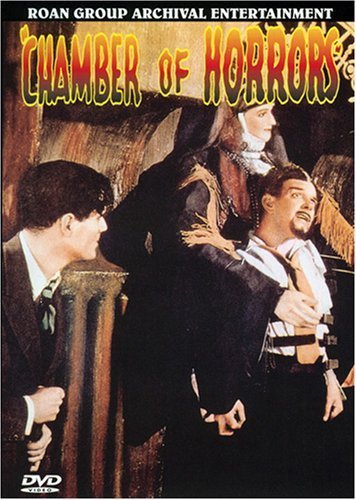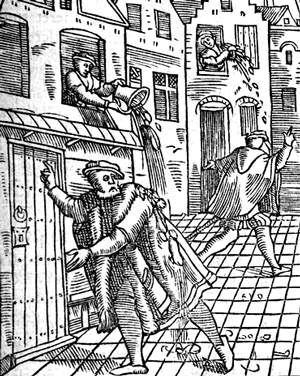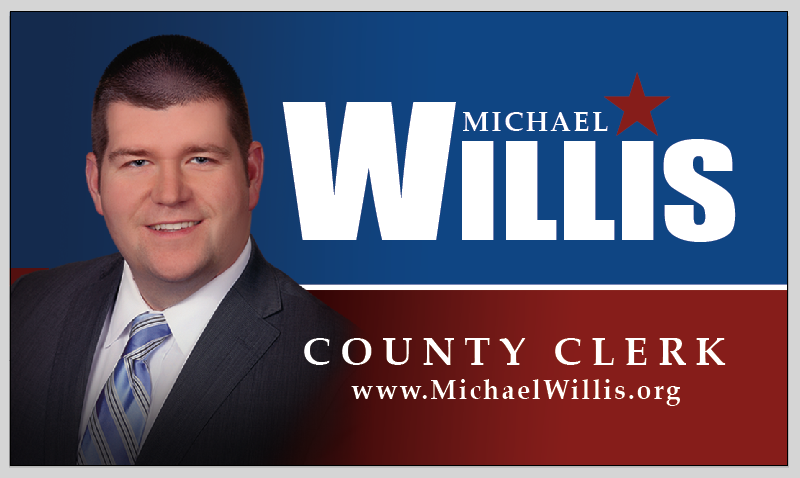Tulsa Election 2016: June 2016 Archives
Sign in Chinon, France. Photo by Peter Curb. Used under Creative Commons license.
If you're a conservative, the Chamber of Commerce is not your friend. Not the U. S. Chamber of Commerce, not the Oklahoma State Chamber of Commerce, not the Tulsa Regional Chamber. If you're a conservative voting in the Republican primary, look to see whom the Chambers are supporting, then give your vote to some other candidate. If the Chambers are attacking a Republican candidate, she's probably worthy of your enthusiastic backing.
This may seem counter-intuitive. Conservative Republicans know that the free market is the engine of prosperity, and we honor and seek to encourage the entrepreneur who starts and builds a business, creating jobs and providing the products and services we need and want. We oppose taxes and regulations that burden businesses and discourage the creation of jobs. Since Chambers of Commerce claim to be the voice of business, shouldn't conservative Republicans heed their advice?
As with many organizations, the claim to speak for a valued segment of the community doesn't reflect the reality of the situation. Chambers of Commerce came into existence to boost business through business cooperation. But Chambers of Commerce are among the many once-noble American institutions that have been co-opted by self-serving special interests and Leftists who are pursuing social transformation and ever-bigger government. There are plenty of other examples: The American Association of Retired Persons, the National Education Association, the YWCA are just a few that come to mind.
It works like this: An organization offers some valuable service to attract members. The AARP offers discounts and insurance, the NEA's state affiliates offer legal coverage (and require membership in the NEA in order to belong to the state association), the YWCA offers access to swimming pools and exercise classes, the local Chamber offers group insurance coverage for small businesses that might not have enough employees to set up something on their own.
These benefits attract members who will be content as long as the services that induced them to join are provided and who aren't likely to get involved in the governance of the organization. These members get a ballot for board members in the mail, and, after a moment's glance, they toss the ballot in the recycle bin.
The broad-based but uninvolved membership gives the organization a credible claim to be the voice of retirees, of teachers, of women, or of business. The leadership, elected by the much smaller body of involved members, can then use that credibility to push an agenda of which the membership may be completely unaware and which they might reject, were they paying attention.
That agenda may reflect the economic benefit of the most influential members, companies that prefer to profit by means of rent-seeking rather than risk-taking. It may reflect the social agenda of the leftists who pursue careers in the not-for-profit sector. The direct approach to social transformation through elections has had mixed results, but the Left has found considerable success in pushing radical ideas by means of organizations with a history and reputation of being non-ideological, evading the defenses citizens put up against political influence.
The two types of influence can work hand in hand. The non-profit employees at Anycity Metro Chamber, as faithful yacht guests, are happy to push for expensive and useless infrastructure projects that benefit the big construction companies who control Anycity Metro Chamber. The big companies are happy to advance leftist social causes as long as they get their way on economic issues. Sometimes interests coincide: For example, Leftists like illegal immigration because it dilutes the votes of those who support the traditional American approach to society and economics; Big Business likes illegal immigration because it dilutes the cost of labor.
Enough theory. Let's get into some examples of how chambers of commerce from the local to the national level are actively working against the interests of conservatives:
On June 3, 2016, Jeff Dunn, chairman of the board of the Tulsa Regional Chamber, described conservative legislators pursuing legislation on issues like abortion and religious liberty as "nut jobs":
The chairman of the Tulsa Regional Chamber complained Friday that "nut jobs on the periphery" wield too much influence in the Oklahoma Legislature."We value our relationship with legislators," Chairman Jeff Dunn said during the chamber's annual recap of the legislative session. "(But) I would submit we need some counseling."
The "nut jobs," Dunn said, are preventing the rest of the lawmakers from being as productive as they might be.
Dunn, president and CEO of Mill Creek Lumber, was upset by what he called a "disappointing" legislative session, particularly in regard to education and long-term reform of the state's finances.
Earlier, in opening remarks, Dunn said legislators are too prone to "go off on tangents" instead of concentrating on state government's core missions.
"When we go off on tangents, we look like North Carolina," Dunn said. "And when we look like North Carolina, it's bad for business."
"North Carolina" is an allusion to the swift action taken by that state's legislature to protect the rights of citizens and business owners after the City of Charlotte passed a draconian ordinance that would have, among other effects, required gyms to allow men claiming to be women to use the same changing rooms as actual women. To Dunn, legislation that defends individual liberty and personal conscience, because it runs against the leftist norms enforced by the news media and the entertainment industry, makes a state look backwards and hurts its business prospects.
 Evidently, the leadership and membership of the Tulsa Regional Chamber are just fine with Dunn's insulting and intemperate remarks. He's still listed as Chamber chairman. I find no reports of calls for his resignation or removal, no indication of mass resignations over his remarks. While most Chamber members are likely too busy running their own businesses to pay attention to Chamber politics, Chamber board members share Dunn's culpability if they decline to denounce or distance themselves from his remarks.
Evidently, the leadership and membership of the Tulsa Regional Chamber are just fine with Dunn's insulting and intemperate remarks. He's still listed as Chamber chairman. I find no reports of calls for his resignation or removal, no indication of mass resignations over his remarks. While most Chamber members are likely too busy running their own businesses to pay attention to Chamber politics, Chamber board members share Dunn's culpability if they decline to denounce or distance themselves from his remarks.
Longtime BatesLine readers will recall articles about Tulsa Regional Chamber involvement in wasteful, corporate-welfare-laden sales tax hikes and their attacks on City Councilors (especially conservatives) who sought to subject the Chamber to healthy competition for city contracts, who sought to put the interests of city residents ahead of suburban developers, who sought to ensure that federal community development funds actually went to help Tulsa's neediest neighborhoods. What's new is the Chamber's apparent hostility to conservative concerns about the use of government to impose leftist social views.
In an earlier entry, I mentioned the Tulsa Regional Chamber's diversity initiative, with its surveys that convey the message that sexual orientation and gender identity are inborn, immutable characteristics on par with race and ethnicity, despite all scientific evidence to the contrary. These surveys measure a company's commitment to diversity by whether they give domestic partner benefits, sponsor or participate in gay pride parades, and prioritize giving contracts to LGBT-owned businesses. Why would any conservative remain on the board of an organization that funds this kind of propaganda?
Earlier this year, OCPA President Jonathan Small summed up the Tulsa Regional Chamber as a left-wing echo chamber:
Remember the Tulsa Regional Chamber? Its leadership in 2014 participated in a failed attempt to support U.S. Sen. Mary Landrieu, who was trying to prevent Republicans from gaining the majority in the U.S. Senate. Imagine if some of the leadership of the Tulsa Regional Chamber had succeeded. Sen. Harry Reid would still be the Senate majority leader. Majority Leader Reid likely would be using the "nuclear option" to ramrod through an extremely left-of-center Supreme Court justice nomination to replace Justice Antonin Scalia.Once again the Tulsa Regional Chamber is in lock-step with the Obama administration. Obama's administration tried to stifle a very popular school choice program in Louisiana and Washington, D.C. The Tulsa Regional Chamber lobbied against efforts to implement ESAs and is now an accomplice in the death of two bills that would have helped the most vulnerable in Oklahoma.
In fairness, the Tulsa Regional Chamber is consistent. The chamber parrots the funding requests of state agencies, proffers the Medicaid expansion as one of the best economic deals ever offered the state and tries to kill tax relief for all while working for special interest tax breaks. The chamber even tried to cripple the oil and gas industry with exorbitantly high taxes just before the downturn.
Some who have left the Tulsa Regional Chamber or refuse to join will tell you that's because it has become an echo chamber for policies that benefit the growth of big government, with more and more special interests of government involved in the chamber's processes.
Sadly, thousands of Oklahoma's most vulnerable children will lose in part because of the lack of intellectual diversity in the Tulsa Regional Chamber.
In another article, OCPA looked at the presence on the Tulsa and Oklahoma City chamber membership rolls -- and detected a pattern that could explain their support for higher taxes:
In recent years chambers of commerce in this state have done yeoman's work in fighting for important policies such as Right to Work, workers' compensation reform, and lawsuit reform. However, many of these same chambers also lobby strenuously for bigger government, including increased funding for medical welfare programs and for the state's bottomless-pit education monopoly. These chambers lobby against prudent fiscal measures, such as one (not exactly draconian) proposal which would limit the annual growth of state government spending to 9.5 percent. Why is this?Part of the answer can be found by examining the chambers' membership rosters. In addition to scads of nonprofit organizations (which may or may not receive taxpayer money), one discovers more than a few blatant "'tax eater' entities," to borrow Stephen Moore's phrase.
 As for the State Chamber of Commerce, they joined with the Tulsa, Oklahoma City chambers and the U. S. Chamber in a lawsuit to block implementation of employment-related provisions of HB 1804, provisions that would have required Oklahoma employers to verify the employment eligibility of the people they hired. In other words, the Chambers at all levels worked to take the teeth out of the law, to disarm the provisions that made it an effective deterrent to illegal immigration.
As for the State Chamber of Commerce, they joined with the Tulsa, Oklahoma City chambers and the U. S. Chamber in a lawsuit to block implementation of employment-related provisions of HB 1804, provisions that would have required Oklahoma employers to verify the employment eligibility of the people they hired. In other words, the Chambers at all levels worked to take the teeth out of the law, to disarm the provisions that made it an effective deterrent to illegal immigration.
The State Chamber also pushed hard for Obamacare Medicaid expansion (euphemistically called "rebalancing" this year) and Common Core. The State Chamber targeted a strongly pro-business conservative Republican, State Sen. Josh Brecheen, for defeat because he supported Common Core repeal and opposed a special tax cut for energy producers, preferring instead to give general tax relief to the state's taxpayers.
Back in 2007, economist Stephen Moore wrote:
In Oklahoma the state chamber filed a petition with the state Supreme Court to block eminent domain reform, and vowed to fight a taxpayer-led movement to enact a Colorado-style [taxpayer bill of rights].
This transcript of a July 2012 State Chamber meeting in Tahlequah quotes the chamber's lobbyist, Chad Warmington, saying, "the legislature spends a lot of time talking about things that just don't matter - I mean, they want to talk about tax cuts and all that stuff."
Also in 2012, then-State Rep. David Dank bemoaned the role "pro-business" lobbyists played in preserving special interest tax credits at the expense of tax relief for all Oklahomans (hat tip to OCPA's Brandon Dutcher):
Sadly, those same lobbyists who secured sweetheart deals for the beneficiaries of tax credits managed to kill most efforts to reform or repeal them during the 2012 session. We did manage to phase out two of the most abused and wasteful tax credits, but dozens of others are being reinstated in July.In short, the special interests won and the people lost. A primary reason Oklahoma taxpayers will see no income tax relief next year is that a few favored industries will continue to cash in on the public treasury through a still-broken tax credit system.
My rule of thumb is to look for the Chamber label -- who has endorsements and money from Chamber-connected PACs and dark-money groups -- and to vote for someone else. Like many other institutions that started out with nobler purposes, Chambers of Commerce have become a partnership of Leftists who have co-opted the organizations in support of their agenda of bigger, more intrusive government and social transformation and businesses who use the Chambers to put the "pro-business, pro-growth" stamp on measures that transfer taxpayer dollars to their pockets.
MORE:
The problem is not limited to Oklahoma. Chambers of Commerce in other states have lobbied against stricter immigration enforcement, for corporate welfare and eminent domain abuse, and against protections for citizens who believe that there are important distinctions to be drawn between a natural, normal marriage and a "same-sex marriage" and between a real woman and a "transwoman." Here's a sampling of news stories and conservative commentary documenting the hostility of Chambers of Commerce to conservative causes:
Luke Sherman for Tulsa County Sheriff has released surveillance video that they claim shows Aaron Brewer, campaign manager for recently elected Sheriff Vic Regalado, blocking the visibility of Sherman's yard signs by placing other signs before and behind them.
This is an old, petty tactic. It's hard to believe that a campaign manager would stoop to this instead of attending to more pressing responsibilities. If true, it would show a surprising degree of desperation.
The Sherman campaign is emphatic that the video shows Aaron Brewer:
Surveillance video obtained by the Luke Sherman for Sheriff campaign definitively shows Regalado Campaign Manager, Aaron Brewer, sabotaging Luke Sherman signs in Tulsa County. A Sherman volunteer installed the surveillance camera out of his frustration from seeing Sherman signs defaced across Tulsa County."We knew someone was sneaking around blocking and damaging our signs. I just didn't want to believe Regalado's campaign would stoop to that level," Luke Sherman says. "But the camera doesn't lie. That is unquestionably Aaron Brewer deliberately blocking my signs with signs from other Republican campaigns he's not even affiliated with. He brazenly used signs from Jim Bridenstine and other Republican candidates, throwing them under the bus, while trying to deceive voters into thinking the Regalado campaign had nothing to do with it."...
Sherman is happy to provide any supporting video and pictures of the surveillance which inextricably confirms Regalado's Campaign Manager, Aaron Brewer, is the person seen in the attached videos.
As of noon Monday, Brewer had not responded to a Facebook message sent at 1:17 a.m. requesting comment.
Tulsa County Assessor Ken Yazel has, in his personal capacity, endorsed Donald Newberry for Tulsa County Court Clerk and Josh Turley for Tulsa County Commissioner District 2.
The Court Clerk manages court records and processes marriage licenses. Sally Howe Smith, the longtime incumbent, is not seeking re-election. Yazel is recommending Donald Newberry to replace her:
Don is the most qualified candidate for Tulsa County Court Clerk. He has worked in the Tulsa Assessor's office for the past six years, serving Tulsa County citizens with loyalty and professionalism. During this time Don successfully completed his MBA then and a Masters in Indian Law at Tulsa University.Don currently manages our Title Research Department and his professionalism has been nothing but exemplary. His ingenuity and business mind combined with his management skills and education is exactly what this County needs in an elected official. While I am sad to lose such a valuable employee, I applaud Don's desire to see local government continue to move towards a system of honesty, transparency and customer service.
The incumbent District 2 County Commissioner is Democrat Karen Keith, who was first elected in 2008 and was re-elected without opposition in 2012. Two candidates are competing for the Republican nomination and the opportunity to run against Keith in November. Yazel has endorsed Josh Turley:
Tulsa County is on the brink of change. As Tulsa County Assessor I am endorsing Josh Turley for Tulsa County Commissioner District 2.We need real change at the county commissioner level. We need a leader who will stand up for what is right. A leader who will address the needs of our citizens. A leader that will open the Tulsa County budget and financials for all citizens to see. A leader who will answer your phone call. It is time for change, it is time for real leadership. It is time to back Josh Turley for Tulsa County Commissioner.
Turley is a 24-year veteran of the Tulsa County Sheriff's Office, serving as a crime scene investigator and then creating the first risk management program for TCSO, which succeeded in reducing car accidents involving deputies and tort claim payouts.
Yazel's mention of the budget is important, and it's why I'm inclined to trust Yazel's guidance in filling these positions. All eight elected county officials (three commissioners, assessor, clerk, court clerk, sheriff, treasurer) serve on the budget board. Yazel has been pushing for years to account for all sources of funding in the county budget process -- not just the revenues generated by the general fund property tax millage, but revenues generated by services, earmarked revenues, and carryover funds. Recognizing that there are different "colors" of money (legal restrictions on how various funds can be spent), if officials and the public have the whole revenue picture, the budget can be more efficiently allocated. If an office or taxing entity already has a significant amount of money from restricted funds and unrestricted carryover to fund its activities, it won't need as much from the general fund, leaving more money to fund projects and programs without asking taxpayers for higher sales taxes or property taxes.
On his website, Turley writes:
I am running for commissioner because I have seen the waste. I have experienced the failures of privatization of the jail. I have seen the dilapidated county buildings. I have watched our overflowing juvenile facility get worse. I have seen our outdated county vehicles. I have watched government fail to address our old levee. I have watched as year after year we struggle to open our pools. I believe we are not spending your money appropriately.
Turley also notes that, despite funding for the juvenile justice center in two separate sales tax packages, the county has yet to break ground on this much-needed facility.
On the strength of Ken Yazel's recommendation, I plan to join him in voting for Donald Newberry and Josh Turley in Tuesday's primary.
MORE:
Conservative activist leader Ronda Vuillemont Smith plans to vote for Newberry but is undecided in the County Commission race:
I am undecided on this race and may just flip a coin to determine who to vote for. I believe either one will serve us well bringing new ideas and vision for Tulsa county. One the one hand, Turley has worked in county government and is familiar with procedure and protocol while having an understanding of the needs of Tulsa County. On the other hand I have known Grable for a number of years and have spent time listening to his thoughts and ideas and I believe he has a future in politics. His experience in having worked at the state capitol would be beneficial to the office of County Commissioner. Full disclosure: I have donated to Grable's campaign.
On Tuesday, June 28, 2016, Republican voters in Tulsa County will decide which of two candidates will be our next County Clerk. The incumbent is not running for re-election, and only two Republicans filed for the seat: Michael Willis and Nancy Rothman.
Online access to public records is a big deal to me. Part of what has enabled me to research and write about public matters for the last 13 years is the ready availability of information online. I have a job, and I have a family, and if I had to burn vacation hours to go to City Hall or the County Courthouse during normal office hours to do my research, it wouldn't happen very often.
When I researched my story on Tulsa's lost Near Northside neighborhood, the land ownership angle was important enough that I took time off work and went to the courthouse during normal business hours, passing through the metal detectors and having my wallet x-rayed, so that I could sit at one of the public access terminals in the county clerk's office. Plat maps were available only as pages in a book -- a shame since they contain fascinating historical information like the locations of streetcar tracks and streets that were later wiped out by urban renewal and expressway construction.
It doesn't have to be that way. When, out of curiosity, I wanted to find the address of a Florida house my in-laws owned as an investment for a few years in the 1970s, it took about 15 minutes of online research before I had a digital image of the deed on my computer screen.
For 32 years, the Tulsa County Clerk's office has been ruled by a single dynasty: Joan Hastings served from 1985-2001. Her deputy, Earlene Wilson, served as county clerk from 2001-2013, and Wilson's deputy, Pat Key, was elected in 2012, but Key has opted not to run for re-election. Her deputy, Nancy Rothman, is running for the office.
While county clerks across the country have made land records and documents readily available online, the Tulsa County Clerk's office, under the Hastings-Wilson-Key-Rothman dynasty, has resisted the online public records revolution.
There have been a few minor improvements recently. You still have to pay for online access to county clerk land records, but as of last September you no longer have to get the permission of the County Commission to set up an account. The mainframe-based LRMIS system for assessor and treasurer records is now available for free, but Assessor Ken Yazel has long provided an easy-to-use website to access the same information.
Not only have Rothman and her dynastic predecessors failed to serve the public's access to public records, Nancy Rothman's record of disastrous self-management makes it clear that she has no business managing public funds or public assets of any sort.

We need a change. We need a county clerk with the right vision -- facilitating public access to public records -- and the skill set to make it happen. That's why I'm supporting Michael Willis. Willis has 10 years experience working in government and a master's degree in public administration. He has served as an aide to Mayor Bill LaFortune and most recently as a chief deputy to the County Commission. He has overseen significant improvements to the Tulsa County website, streamlining access to public information. Willis supports the expansion of free online access to public documents, including land records.
Just as important, Willis is a devoted husband and father, a decent, principled human being without a whiff of scandal in his life.
The same cannot be said about Nancy Rothman, who lost custody of her two sons and had to pay her ex-husband's attorney's fees because of behavior that the Oklahoma Court of Civil Appeals called "reprehensible" in accusing her ex-husband of molesting one of his sons, seeking to alienate their sons from their father, and plotting to plant child pornography in her ex-husband's apartment. At the same time, she appears to have squandered a generous divorce settlement, remortgaging her sprawling midtown mansion for ever greater amounts until she declared bankruptcy in 2006. To my knowledge, Rothman has never expressed remorse for her actions. More ought to be said about this woman who, despite her nefarious behavior, continues to be appointed to positions of public trust by people who should have better judgment, and I intend to say more in a separate entry.
Even if his opponent were a decent, upstanding citizen, Michael Willis's experience, knowledge, and character would still make Willis the best choice for Tulsa County Clerk, and I urge you to join me in voting for Willis on Tuesday, June 28, 2016.
Back last November and again in April during filing for candidates for city offices, I begged for a principled conservative to throw his hat in the ring for Mayor of Tulsa, so we wouldn't be left with a Hobson's choice between Tweedledee Jr and Tweedledum IV, both of whom have embraced a failed understanding of what makes for a livable, lovable city. After two days of filing, the only alternatives were two perennial candidates with problems of their own.
 On the final day of filing, Tom McCay answered the call, and he has my support and my vote to become Mayor of Tulsa.
On the final day of filing, Tom McCay answered the call, and he has my support and my vote to become Mayor of Tulsa.
McCay's reason for getting into the race: "I kept waiting for someone in office to represent me, my family and my neighbors. When I realized that wasn't going to happen, I became that someone." He notes, "There is no real difference between GT Bynum & Dewey Bartlett, who have virtually identical platforms."
Tom McCay and his wife, Lisa, have been married for 30 years, and they have five children -- two daughters who are working as professionals, a son in college at OSU, and two more daughters still at home. McCay is a designer and creator of jewelry. Many years ago he founded and directed Tulsa's first improvisational comedy group, the Obnoxious Party Guests. The McCays are active members of Christ the King Parish (Catholic). The McCays live near 31st and Mingo, and if Tom is elected, he would be the first mayor of Tulsa in 28 years who doesn't live in the Midtown Money Belt.
McCay's vision of city government is one that focuses on its core mission, while reducing the obstacles to the formation and growth of small business. One of his ideas is to lengthen the terms of the city licenses and permits so that small businesses don't have to deal with the direct and indirect costs of licenses and permits as often. The overall fiscal impact to the city is small, but it can make a big difference to an individual business.
It's fair to say that McCay, like most Tulsans, isn't intimately familiar with the nuts and bolts of city government. That's OK. Since the switch to a mayor-council form of government in 1990, every mayor has handed off the day-to-day responsibilities for city government functions to a city manager under various titles -- Chief Administrative Officer, Chief Operating Officer, to name a couple. (Before 1990, the functions of city government fell to the separately elected commissioners for water and sewer, streets and public property, police and fire, and finance.)
The important thing is to have a mayor with the right vision and guiding principles. The leading candidates are both under the misapprehension that a city's growth and prosperity depends on an activist government commissioning the right big projects and offering the right incentives to lure big companies to town. Tom McCay is a conservative who believes in American exceptionalism and free-market capitalism. He understands that government's role in fostering prosperity consists in performing its basic functions and getting out of the way of individual creativity.
Tom McCay wisely opposed the ill-considered Vision Tulsa tax increase, while the two Money Belt candidates both supported it.
Tweedledee IV and Tweedledum Jr are both enthusiastic supporters of using city government force to impose acceptance of the philosophy and mores of the Sexual Revolution, following the oppressive examples of Charlotte and Houston. McCay would allow Tulsans the freedom to exercise their own judgment in deciding whether to make a distinction between actual women and men who claim to be women, between natural marriages grounded in the biological facts of life and same-sex pseudogamy that seeks the honor due to marriage, the freedom to decide how to handle these challenging issues in the context of their families, churches, schools, civic organizations, and businesses.
I am grateful to Tom McCay and his family for leaving their comfort zone and running for office, because it means we have the opportunity on June 28 to cast our vote, not for the lesser of two evils, but for an honorable Christian gentleman who shares our values and our philosophy of government.
